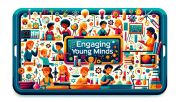
Maximize Your Skills: The Ultimate Guide to Excelling in Online Courses
Discover the ultimate guide to excelling in online courses, unlocking your full potential for personal and professional development.
The evolution of online learning has transformed the way people acquire new skills and knowledge, with e-courses becoming increasingly popular in recent years. As technology advances, the accessibility and flexibility of online education have made it a convenient option for personal and professional development. The rise of e-courses has provided individuals with the opportunity to learn from the comfort of their own environment, breaking down geographical barriers and allowing for a more globalized approach to education. This shift has opened up a world of possibilities for learners, offering a wide range of courses across various fields and disciplines, catering to the diverse needs and interests of students. As such, the evolution of online learning has not only revolutionized education but has also paved the way for continuous learning beyond traditional classroom settings.
Online courses offer numerous benefits for personal and professional development. One of the main advantages is the flexibility they provide, allowing individuals to learn at their own pace and in their own time, which is especially valuable for those with busy schedules or specific time constraints. Additionally, e-courses offer a wide range of subjects and specializations, granting learners the opportunity to explore new areas of interest or develop specific skills and knowledge relevant to their professional growth. Online courses also often provide access to expert instructors and resources that may not be readily available in traditional educational settings, thus offering a high-quality learning experience. Moreover, completing online courses can enhance one's resume, demonstrating dedication to continuous learning and initiative to acquire new skills, which can be valuable for professional advancement. Finally, the cost-effectiveness of e-courses compared to traditional education is another significant benefit, making high-quality learning accessible to a wider audience.
Top-quality e-courses are designed with several key features that ensure effective learning for students. One such feature is the use of interactive and engaging content, including videos, quizzes, and simulations, to keep learners actively involved in the learning process. Additionally, these e-courses offer personalized learning experiences, allowing students to learn at their own pace and receive individualized feedback and support. Another important feature is the inclusion of practical, real-world applications and case studies that help students connect theoretical concepts to practical skills. Furthermore, top-quality e-courses often provide opportunities for collaborative learning through discussion forums, group projects, and networking events, enabling students to learn from their peers and build valuable connections within their industry. Lastly, effective e-courses incorporate regular assessments and feedback mechanisms to track student progress and ensure that learning objectives are being met.
Choosing the right online course that aligns with your learning goals is a crucial step in maximizing your skills and knowledge. Whether you are looking to enhance your professional development or pursue personal interests, there are several key considerations to keep in mind when selecting an e-course. First, evaluate your learning objectives and preferred learning style. Are you looking for a self-paced course or one with structured timelines? Do you prefer video lectures, interactive modules, or written materials? Furthermore, research the course content, instructor credentials, and reviews from previous participants to ensure the course meets your expectations. Additionally, consider the level of support and resources available, such as discussion forums, access to instructors, and supplementary materials. Finally, assess the flexibility, cost, and potential for accreditation or certification to determine the overall fit of the course with your learning goals.
Staying motivated and disciplined in an online learning environment can be challenging, but with the right strategies, it's definitely achievable. One key approach is to set clear and achievable goals for yourself. By having a roadmap of what you want to accomplish, you can stay focused and motivated. Additionally, creating a study schedule and sticking to it can help establish a routine and improve your discipline. It's also important to eliminate distractions during study time, whether it's turning off notifications or finding a quiet space to work. Setting up a reward system for reaching milestones can also be a great motivator. Lastly, staying connected with fellow online learners can provide a support system and help you stay engaged in your studies.
Balancing online courses with other responsibilities can be challenging, but with effective time management, it is definitely achievable. One tip is to create a schedule that includes dedicated time for studying and completing course work. This can help you stay organized and ensure that you allocate enough time for your online courses. Another tip is to prioritize tasks and set realistic goals for each study session. By breaking down your coursework into smaller, manageable tasks, you can prevent feeling overwhelmed and tackle your responsibilities more effectively. Additionally, it's important to take advantage of productivity tools and resources that can help you stay on track, such as time management apps, online calendars, and task management systems. Lastly, don't forget to communicate with your instructors and peers about any challenges or conflicts that may arise. They can offer support and flexibility to help you balance your online courses with other responsibilities.
Leveraging community and networking in online courses is a powerful way to enhance your learning experience. Connecting with fellow students, instructors, and industry professionals can provide valuable insights, support, and opportunities for collaboration. Engaging in discussions, group projects, and online forums allows you to gain diverse perspectives, learn from the experiences of others, and build a network of like-minded individuals who can offer guidance and mentorship. Moreover, participating in virtual events, webinars, and networking sessions can help you expand your professional circle and stay updated on industry trends and best practices. By actively engaging with the online learning community, you can enrich your educational journey and establish meaningful connections that can benefit your personal and professional growth.
The role of interactive tools and multimedia in enriching online education is crucial for creating engaging and effective learning experiences. Interactive tools such as virtual simulations, games, and quizzes not only make the learning process more fun and enjoyable but also help students understand complex concepts easily. Multimedia resources, including videos, animations, and audio recordings, enable students to learn at their own pace and in their preferred style, catering to visual, auditory, and kinesthetic learners. These tools also facilitate active participation and collaboration among students, fostering a sense of community and enhancing the overall learning experience. Furthermore, the integration of interactive tools and multimedia promotes critical thinking, problem-solving, and creativity, preparing students for the demands of the digital age and the evolving job market.
Assessing your progress in an online course is crucial for tracking your learning journey and identifying areas for improvement. Practical application of the knowledge and skills gained is equally important as it allows you to reinforce your learning through real-world scenarios. Regularly evaluating your progress helps you stay on track with your learning goals and ensures that you are making meaningful advancements. By applying what you have learned in practical situations, you can gain valuable insights and develop a deeper understanding of the course material. The combination of assessment and practical application maximizes the effectiveness of online learning and allows you to fully capitalize on the knowledge you have acquired.
As technology continues to advance and evolve, the landscape of online education and continuous learning is also set to undergo significant changes in the future. The rise of artificial intelligence, virtual reality, and augmented reality is expected to revolutionize the way online courses are delivered, making them more immersive and interactive. Additionally, there will be a greater emphasis on personalized learning experiences, as technology enables the customization of course content and teaching methodologies to cater to individual learning styles and preferences. The integration of big data and analytics will also play a crucial role in providing insights into learner behavior and performance, allowing for more effective and tailored interventions. Moreover, the increasing globalization of education is likely to result in a more diverse range of online course offerings, with learners having access to a broader spectrum of subjects, instructors, and learning resources from around the world. With these advancements, the future of online education holds great promise for those seeking to continuously enhance their skills and knowledge.
Related posts






